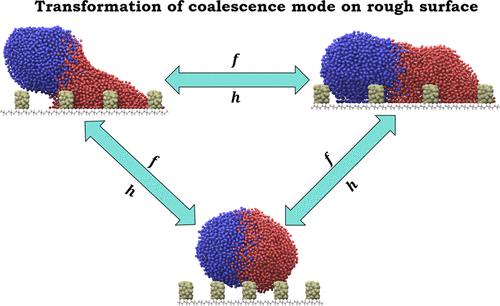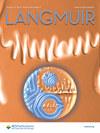Coalescence Mechanism Induced by Different Wetting States of Ti and Al Droplets on Rough Surfaces
IF 3.7
2区 化学
Q2 CHEMISTRY, MULTIDISCIPLINARY
引用次数: 0
Abstract
There is currently increasing interest in droplet transportation and coalescence on rough surfaces. However, the relationship among wettability, coalescence mode, and substrate characteristics (roughness and nanopillar height) remains unclear. In this work, two coalescence modes, climbing coalescence and contacting coalescence, are first observed in the dynamic behaviors of Ti and Al droplets on rough substrates. Due to the nonsynchronized wetting state transition of the droplets, the coalescence mode with increasing substrate characteristics differs, transitioning from contacting coalescence to climbing coalescence and then returning to the contacting mode. In general, the mode of coalescence correlates closely with the respective wetting states. Typically, Ti and Al droplets coalesce in the contacting mode when they have the same wetting state, but if they have different wetting states, they coalesce in the climbing mode. Our results emphasize the complicated relationship between the surface structure and the wettability of droplets, which could provide insights into self-assembly, three-dimensional printing, and microfluidic devices.

粗糙表面上钛和铝液滴不同润湿状态引发的凝聚机制
目前,人们对粗糙表面上的液滴输送和凝聚越来越感兴趣。然而,润湿性、凝聚模式和基底特性(粗糙度和纳米柱高度)之间的关系仍不清楚。在这项工作中,首次在粗糙基底上的钛和铝液滴的动态行为中观察到了两种凝聚模式,即爬升凝聚和接触凝聚。由于液滴的润湿状态转换不同步,随着基底特性的增加,凝聚模式也不同,从接触凝聚过渡到爬升凝聚,然后又回到接触模式。一般来说,凝聚模式与各自的润湿状态密切相关。通常情况下,当钛液滴和铝液滴具有相同的润湿状态时,它们会以接触模式凝聚,但如果它们具有不同的润湿状态,则会以爬升模式凝聚。我们的研究结果强调了液滴表面结构与润湿性之间的复杂关系,这将为自组装、三维打印和微流控设备提供启示。
本文章由计算机程序翻译,如有差异,请以英文原文为准。
求助全文
约1分钟内获得全文
求助全文
来源期刊

Langmuir
化学-材料科学:综合
CiteScore
6.50
自引率
10.30%
发文量
1464
审稿时长
2.1 months
期刊介绍:
Langmuir is an interdisciplinary journal publishing articles in the following subject categories:
Colloids: surfactants and self-assembly, dispersions, emulsions, foams
Interfaces: adsorption, reactions, films, forces
Biological Interfaces: biocolloids, biomolecular and biomimetic materials
Materials: nano- and mesostructured materials, polymers, gels, liquid crystals
Electrochemistry: interfacial charge transfer, charge transport, electrocatalysis, electrokinetic phenomena, bioelectrochemistry
Devices and Applications: sensors, fluidics, patterning, catalysis, photonic crystals
However, when high-impact, original work is submitted that does not fit within the above categories, decisions to accept or decline such papers will be based on one criteria: What Would Irving Do?
Langmuir ranks #2 in citations out of 136 journals in the category of Physical Chemistry with 113,157 total citations. The journal received an Impact Factor of 4.384*.
This journal is also indexed in the categories of Materials Science (ranked #1) and Multidisciplinary Chemistry (ranked #5).
 求助内容:
求助内容: 应助结果提醒方式:
应助结果提醒方式:


